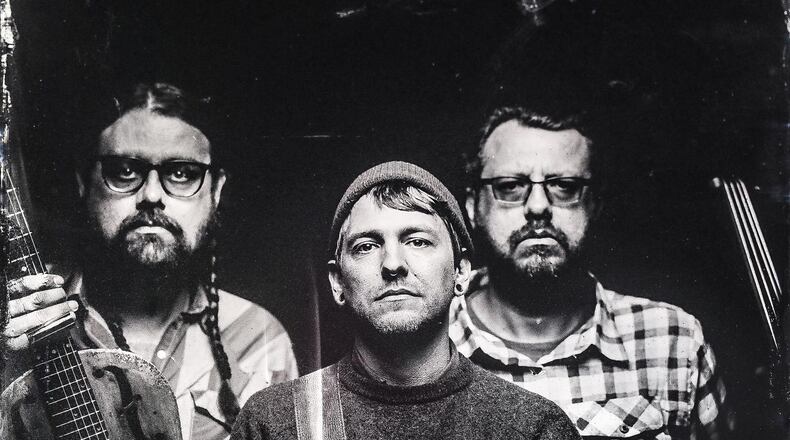What Oberst refers to in his statement about punk rock is not about how it informs the music of the Tillers, but rather how the DIY ethos of punk rock shapes how the band has operated for nearly two decades: how its created community, how its recorded albums and existed without the need of record labels, how its promoted shows and made t-shirts, patches, pins and everything else with a homespun flair.
The Tillers embodies the idea of punk without being a punk band; it does it by being a folk band.
The folk trio cropped up in 2007. The formation eventually landed on Oberst on banjo and brothers Sean and Aaron Geil on guitar and bass, respectively. In 2015, the trio added fiddler Joe Macharet, of Joe’s Truck Stop, to the lineup. Macharet played with the band up until March of this year.
So, in the trio formation once again, the Tillers are tapping back into its original minimalist folk feel.
The band’s sound compounds traditional folk, bluegrass and jazz, with influences spanning Woody Guthrie, southern blues laments and many anonymous tales of Appalachian woods, churches, riverboats, railroads, prairies and coal mines.
Clearly spawning from punk and hardcore scenes, the Tillers bring a distinctive thump and bite to folk music. Its driving percussive strums rejuvenate some very old songs, all while offering tender melodies, heightened by Oberst and Geil’s tenor harmonies, just the same.
“When we started the band, our big realization was, Oh, what can we do with this banjo and this guitar? How can they work together, and how can our voices work together?” Oberst said. “We have to tighten up the nuts and bolts a little bit with having a member leave the outfit. But, at the same time, it’s been nice to hear the three of us again, to strip everything down, kind of reevaluate and think about how we built our sound in the first place.”
In 2008, the Tillers released its first record “Ludlow Street Rag” — named after the street where the band played its earliest gigs for “coins and burritos” — subsequently releasing four more studio records, a live record from the Historic Southgate House, and numerous seven-inches, bootlegs and limited releases.
The band’s been nationally praised as modern folk storytellers. Much like its predecessors in the Cincinnati string/bluegrass/old-timey/folk scenes, the Tillers write a lot of those stories about Cincinnati and the Ohio River Valley.
“I’ve always felt that the regionality of folk music was such a wonderful thing,” Oberst said. “I felt like whatever we could offer, as far as representing where we’re from and our culture, would be really worthwhile to be able to share as we traveled the country, flew overseas and brought a little piece of where we’re from to the people we visited. And hearing their stories from all over the world, too.”
I spoke to Oberst on three separate phone calls: on his way to the mechanic; at the mechanic, but before his 10:45 appointment; at the mechanic, after he checked in. He took the band’s van in to get the brakes looked at, while also having a conversation in three parts.
“The van is still kicking, but it needs some love,” Oberst said, on our third call. “We’re out there still trying to make ends meet in the second van we’ve ever owned, trying to still follow the dream.”
And that seems to be the folk-punk ethos of the Tillers.
Contact this contributing writer at branberry100@gmail.com.
HOW TO GO
What: The Tillers with special guest Eleanor Dakota
When: 7 p.m., Oct. 18
Where: Yellow Cab Tavern, 700 E. 4th St., Dayton
Cost: $15
More info: yellowcabtavern.com
About the Author


